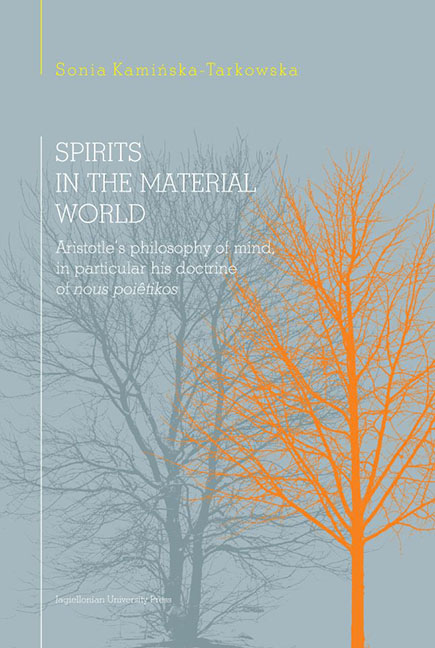 Spirits in the Material World
Spirits in the Material World Early Interpretations
Published online by Cambridge University Press: 14 October 2023
Summary
Theophrastus and Eudemus – An Initial Discord
Let me begin with Theophrastus (371–287 B.C.) who was the successor to Aristotle in Peripatos and who believed that nous poiêtikos was immaterial, that it belonged to the nature of man, that is, to his intellectual soul. On the other hand, Eudemus (370–300 B.C.), who was Aristotle’s student and an editor of his writings, identified nous poiêtikos with Deity (Brentano complains that after reading the Eudemian Ethics one gets the impression that active intellect and Deity are the same …). So, we can see that there was no unanimity even between the immediate followers of Aristotle, which may seem rather puzzling as they were both very close to their master. Theophrastus can be called a rationalist, whereas Eudemus undoubtedly earned the name of a mystic. What could have caused this discrepancy? I will come back to that question later.
Theophrastus is known as one of the most faithful Aristotelian scholars. Giovanni Reale disagrees with this opinion and claims that this is rather an urban legend. Theophrastus’s knowledge is said to have been impressive and comparable to Aristotle’s, but it is the kind of knowledge which we now call ‘science’ (e.g., he invented botany). Whereas in metaphysics and ontology, Theophrastus arrived at different conclusions than the Stagirite and he is said not to have been a very sharp speculative thinker either. When it comes to human psychology, Theophrastus endorses the division into passive and active intellect and locates the latter inside the human soul (Reale calls this ‘accepting Aristotle’s doctrine’). There are, however, several problems. First of all, when he tries to explain why the mind does not think actively all the time, he puts the explanation down to ‘being mixed’. He calls the intellect a mixture of active and passive principle, what we learn from Themistius’s De Anima (108, 22), who – as Brentano puts it – saved these fragments of Theophrastus for us. The other puzzling thing is the issue of the active intellect possibly being innate. All this together seems to question the spirituality of intellect. According to Reale, this is another reason to believe that Theophrastus did not have a metaphysical talent.
- Type
- Chapter
- Information
- Spirits in the Material WorldAristotle's Philosophy of Mind in Particular His Doctrine of Nous Poiêtikos, pp. 27 - 54Publisher: Jagiellonian University PressPrint publication year: 2022


